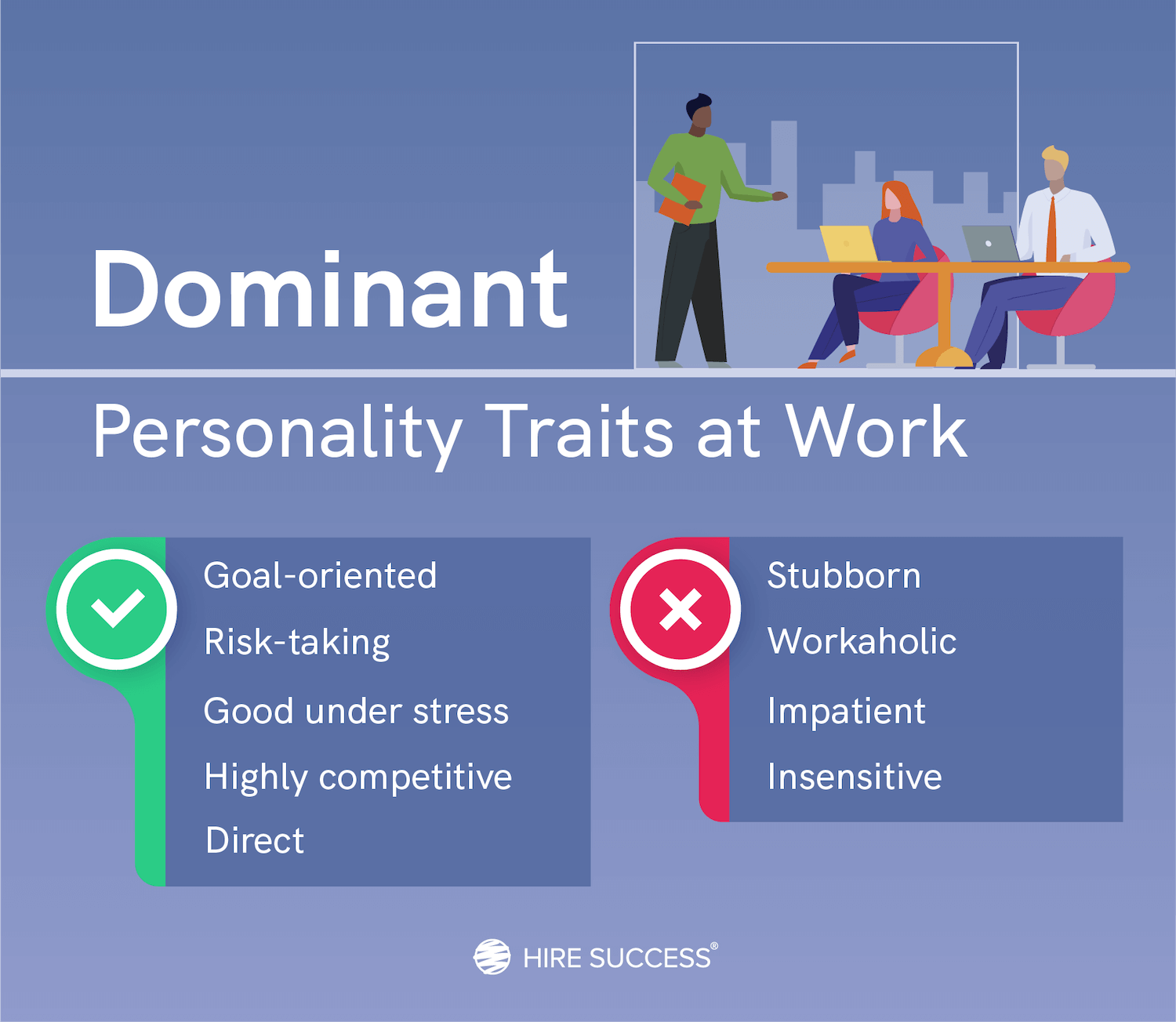You are hiring for a pivotal leadership role. One candidate grabs your attention. They have what you’re looking for: confidence, ambition, and the assertive style of a go-getter and a winner. A thought lingers, though — will they work well with your team? Will they pair disruption with empowerment?
Strong personalities can change the game for your company, driving innovation and powering success, but they can also create friction. Dominant personalities can be invaluable for your teams. When hiring for leadership roles, you need to understand dominant personalities and work with them to create a productive workplace.
This guide will help you make the best use of the positives of a dominant personality for a high-performing organization. And if you have a dominant personality and want to improve your work relationships and job performance, you will find insight here.
Key takeaways
- People with a dominant personality are success-oriented and natural leaders in the best cases, but without emotional intelligence, they can be harmful to your culture and productivity.
- Core dominant personality traits, like confidence, leadership ability, ambition, motivation, and risk tolerance, can be invaluable to an organization, but they are not without their downsides.
What is a dominant personality?
Someone with a dominant personality is confident, assertive, direct, and seeks to influence situations and people. They naturally take charge, standing out on teams and commanding attention wherever they are. They tend to shape the direction of a discussion and are a powerful force in leadership roles, where innovation is needed and positive change must be made.
On the other hand, a dominant personality can create friction, especially if the individual lacks the soft skills of emotional intelligence. They can be impatient and stubborn, might not share control, and in their drive for success, they may not consider the emotions of others. People may come to fear or be intimidated by them.
9 common dominant personality traits
Understanding the value that a dominant personality can play in your company means understanding the traits that typically define the character of this type of person.

- Assertiveness: Dominant people take the initiative. They will give their opinion without being asked. They take risks and act with boldness.
- Confidence: They have a strong belief in themselves and their abilities, and are optimistically sure of success — convictions that inspire others.
- Decisiveness: Giving little time to hesitation and favoring forward momentum, they make fast decisions and act on them just as quickly.
- Goal-oriented: The achievement is their focus. They are determined and will persevere in pursuing excellence.
- Leadership: They take charge and guide teams to a goal. Leadership styles can be reactive or proactive, but they readily supply direction toward achievement.
- Competitiveness: They have a drive to excel and outperform, putting in the work to continuously improve.
- Risk-taking: Uncertainty does not bother them, and fear of failure doesn’t stop them from making bold moves that can lead to breakthroughs.
- Direct communication: They are straightforward to the point of being blunt and prioritize efficiency over feelings.
- Resilience: They bounce back after a setback. Different personalities handle stress in different ways; this personality can endure significant adversity.
What are the strengths of dominant employees?

Having a dominant personality on your work team can be rewarding. They thrive in fast-paced environments, can make decisions quickly, and push forward with confidence. If your company faces serious challenges, has ambitious growth goals, or must innovate in a competitive environment, dominant personalities with their results-driven mindset can be a powerful force for success.
Their assertiveness may feel intense to some, but you may need their energy and determination to achieve your goals. Here are some key strengths they can bring to your company:
- Top producers: They are competitive, productive, results-driven, and want to win.
- Strong leaders: They thrive when taking charge and guiding people in achieving goals. With emotional intelligence, training, and support, they are well-respected and effective on teams.
- Work well independently: Because they are confident and decisive, they don’t need guidance. They work well autonomously and take the initiative without asking for direction.
- Motivators: Their style can inspire confidence. As a promoter personality type, they encourage others to trust in themselves as they create a culture of open and direct communication.
- Strategic thinkers: They enjoy analyzing situations, finding opportunities and paths forward, and making bold decisions that can drive success.
Which job roles do dominant personalities excel in?

Dominant, or type-D, personalities excel in roles that require leadership, decisive action, and a focus on achieving goals. They are fine in high-pressure situations, taking charge, making decisions, and relishing the competition. Show them the goal and let them go. While comfortable with authority, they also thrive in independent roles. They aren’t going to like being managed by a committee.
Examples of roles in which they excel include:
- Pilot: Being calm under pressure, making split-second, life-or-death decisions, managing complexity and ambiguity, and commanding a crew are all traits of successful pilots.
- CEO: They have what it takes to lead a company, think strategically, and make critical decisions.
- Sales Executive: Their competitive streak and desire to win, coupled with confidence, empower them to go out, face hearing “no,” and close deals.
- Project Manager: They will take on a complex task, drive toward deadlines, and keep teams focused and motivated.
- Attorney: They need confidence before clients, adversaries, and the judge in advocating for clients and devising winning legal strategies.
- Entrepreneur: Taking risks, seeing what could be, and then leading people to build and scale a business takes dominant personality traits.
- Military Officer: With leadership, discipline, strategic thinking, and decisive action, this person is born to command.
How to work well with a dominant person
How you work with a dominant personality can foster productive relationships, ensuring they are thriving and that others around them can also flourish. When you achieve that balance, the whole company can achieve unprecedented success.
Fostering productive working relationships means playing to their strengths and respecting their values and style:
- Be direct and get to the point. Communicate with efficiency and don’t sugar-coat messages or add unnecessary details.
- Respect their time. Related to the point above, don’t waste time in long meetings and endless conversation.
- Realize it isn’t personal. The focus on getting things done and taking a blunt approach isn’t meant to be rude or hurt feelings.
- Make sure they know the boundaries of their authority. Taking the initiative is great as long as it aligns with team goals and does not trample on others.
- Encourage them to seek input from others. Less-assertive employees can have great ideas. Dominant personalities may need to make a special effort to encourage them to contribute.
- Respond assertively in non-confrontational ways. You can take a contrary position with confidence and respect without escalating tension.
- Validate their ideas. Even if teams don’t implement the dominant person’s idea, acknowledging their contribution keeps them engaged and motivated.
- Avoid pitting employees against one another. Competition with outside companies is great, but internal rivalries can be toxic. Encourage collaboration and teamwork.
How to identify a candidate with a dominant personality
A well-structured interview process can uncover personality types and the qualities needed to fit into your organization. Watch their behavior in interviews: People with a dominant personality take charge of the conversation, are not shy with opinions, and confidently put forth ideas.
During the interview, they might come off as direct, even blunt, in expressing themselves. When looking at their resume, you may see a succession of leadership roles in their job history.
Your observations alone can be limiting in understanding a person’s personality, potential, and how they can fit and make a contribution. Professionally designed pre-employment personality tests give you unbiased, nuanced, deep insights.
Start by creating a job baseline from your highest-performing team members. This will give you insight into what personality traits work best for each role in your organization. You can then improve your hiring process by using baselines to compare candidates to your top performers, saving time and manual effort in screening before you hold interviews.
Hire Success® solutions like the Pre-Employment Personality Test can help you identify a dominant personality quickly and without bias. Using the information gleaned from the test, you can evaluate whether a candidate is a good fit for the position you’re trying to fill and see if their values align with your company culture.
Say goodbye to guesswork, hire with confidence
Try our platform for free and get unbiased, data-driven insights into candidates' personal qualities and abilities.
Book a Demo Try It FreeCollaborating effectively with dominant personalities
High-performing teams have a mix of personality types. Adding a dominant personality into the right role injects decisive confidence and a motivating desire to get results for the team. The right mix of personalities can be dynamic and energizing.
That said, getting the chemistry and work culture right is vital. Harnessing their strengths into the team dynamics will make the difference between a bad hire and a successful one.
The key is balance — you want to energize without overwhelming, ignite risk-taking without fear, push action without coercion, and share the glory of achievement without one person overshadowing the rest.
Beyond hiring, the right training and development can bring out the best in dominant personalities. You can equip your teams with the resources and professional development opportunities that help dominant personalities and everyone around them thrive. Hire Success® solutions can support positive communication styles, leadership approaches, and strategies for fostering collaboration.
If you’re looking to build a high-performing team with the right balance of leadership and collaboration, we can help you find and develop the perfect fit. Contact Hire Success® today.


